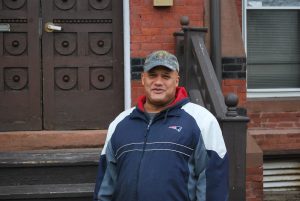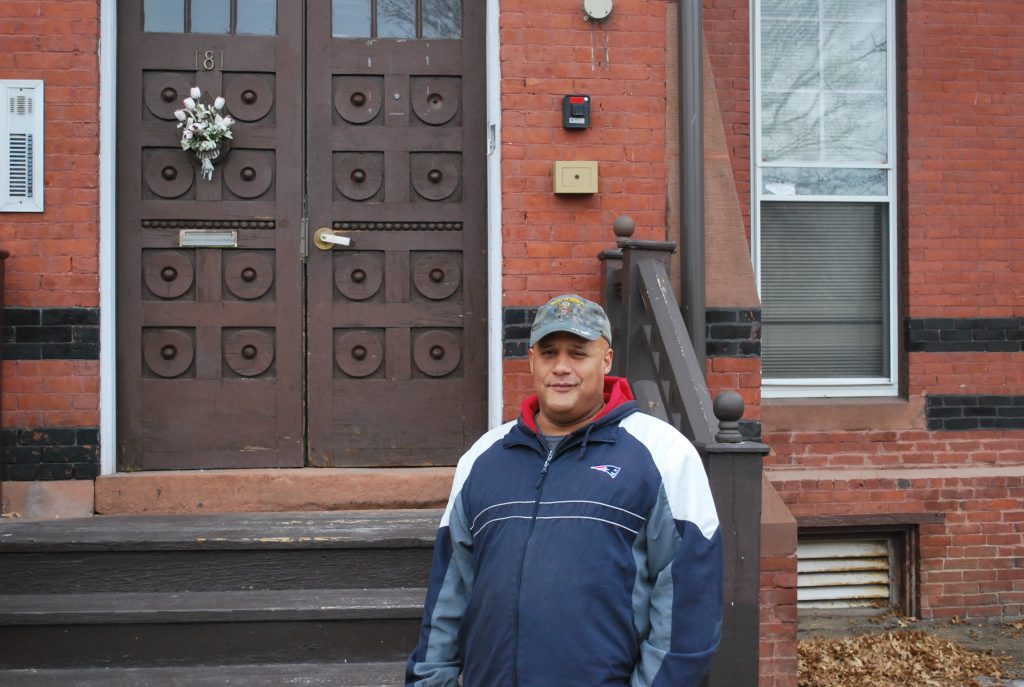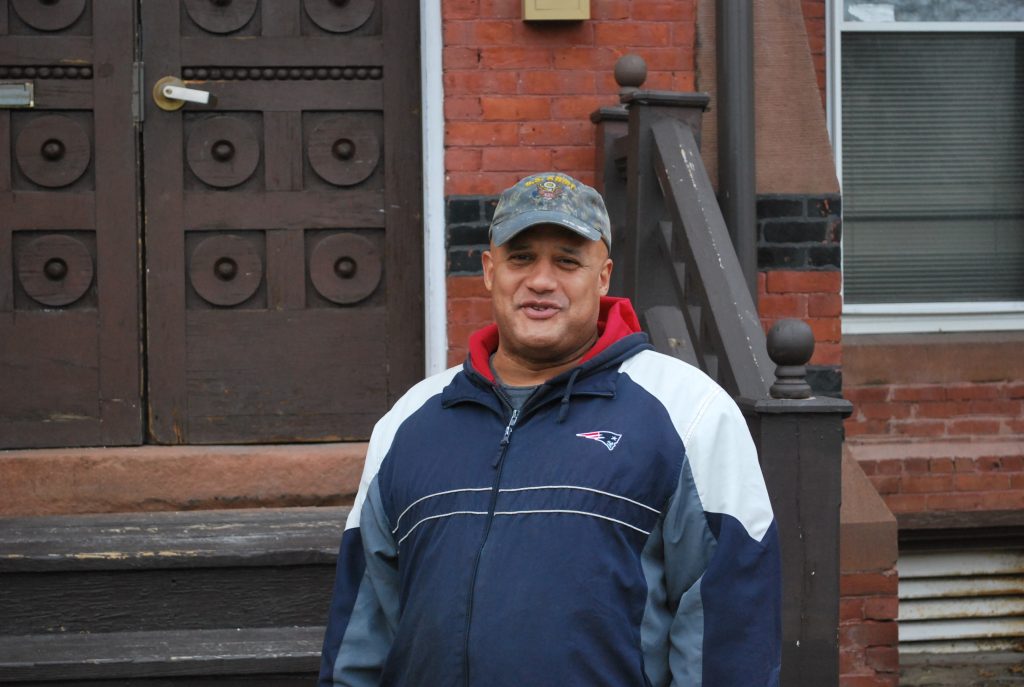Following four years of active duty in the Army during Operation Storm and a subsequent five years in the National Guard, Michael Collazo found himself spending nearly one year in a different type of harrowing circumstance: homelessness.
Collazo, 50, was recently able to find housing by connecting with the city of Holyoke’s Veterans Service Office, which in turn reached out to nonprofit Veterans, Inc., but spent nearly the entire past year unaware of the resources that could get him off of the streets.
“I’m always a positive thinker,” Collazo said. “I knew it was just a matter of time, but it was a good feeling knowing that they talk to the veterans and the positivity that they show them … That doesn’t just give you hope, it lets you know, ‘Wow, that’s just a matter of time.’ And that’s a good feeling.”
Collazo is just one of many homeless people in the Pioneer Valley who are unaware of help they can get, according to those who work in homeless services.

Michael Collazo, a previously homeless veteran, stands in front of his new home — the Chapin Mansion for Veterans in Holyoke. Collazo was homeless for nearly a year. Photo by Chris Goudreau
A former longtime resident of Springfield, Collazo said he became homeless in February 2017 after separating from his now ex-wife of 22 years, partially due to his post traumatic stress disorder (PTSD). He also has four children — ages 9, 10, 14, and 17.
“It gives you anxiety about being out,” he said. “You get depression. It’s hard to get motivated and do things sometimes. It’s even worse when you’re homeless because you feel like you have no backing whatsoever. Once you get the foundation, like I have now, everything starts looking up.”
He said it was unsettling not knowing where he’d be sleeping every night when he was homeless.
There are approximately 3,000 night shelter beds in the state, which are usually full or beyond capacity in the state, according to the Massachusetts Coalition for the Homeless. The coalition also states on its website that the number of people who are homeless has doubled since 1990.
In January 2017, there were at least 17,565 people who were homeless across the state, 853 of whom were veterans, 469 consisted of unaccompanied youth, and 6,267 were adults, based on findings from the U.S. Department of Housing and Urban Development’s 2017 Annual Homeless Assessment Report to Congress.
“There’s a lot of mental health issues out there,” Collazo said. “A large portion have something wrong upstairs to be blunt. There’s decent people out there who just ran into bad luck and they need somebody to help them out so they can get back on their feet. Then there’s the types who don’t want to do anything — they’ve given up on life. You get all sorts. You can’t just put everybody in one basket.”
Collazo said he never panhandled when he was homeless, but understands why some choose to do so.
“It depends on what they were panhandling for,” he said. “I’ve seen people do it literally because they were hungry and I didn’t look down on it. But if you’ve got an addiction and you’re feeding it with that, then I don’t really look highly on that.”
When asked about his thoughts on the Holyoke City Council’s state adopted ordinance to fine panhandlers, he replied, “Good luck getting that money because if you’re panhandling, you’re not going to be able to pay a fine.
Finding resources
Gerry McCafferty, director of housing for the city of Springfield, which distributes Continuum of Care program funding, aimed at ending homeless, across Hampden County, said 80 percent of people who become homeless end up finding housing, but 20 percent become chronically homeless, which is defined as someone who is repeatedly homeless or homeless for more than a year.
She said she thinks people living at shelters often know about the services available for them, but it might be more difficult for people living on the streets to learn about programs that could help them find housing.
“We have a number of outreach efforts that are going out and looking for people who live on the streets trying to find them and get them in this system,” McCafferty said. “The system is very proactive and is trying to find every long-term homeless person and help them get into housing. We work with police departments, emergency rooms, the sheriff’s department, as well as having street outreach that actually walks along river fronts and into places where they know there are camps of homeless people.”
Beth Barbara, universal services advocate with Veterans, Inc., said the Worcester-based nonprofit provides supportive services for veterans and their families across New England.
“Even if you’re couchsurfing, we have the ability to come in and get you into housing,” she said. “We work with you, as long as you meet eligibility requirements, which is one day of active duty and an honorable discharge … We’re on Craigslist every day looking for apartments. We’re working with the barriers that they might have, whether they have a criminal background or substance abuse or lack of income.”
Barbara said it took six weeks for Collazo to find housing in the city. He now lives at the Chapin Mansion for Veterans, a 19th Century Victorian home in the heart of downtown Holyoke along with other previously homeless veterans.
“It’s great. Everybody is perfect,” Collazo said. “We’re all like-minded. Everybody sticks to themselves. They’re quiet.”
A handful of the veterans living at Chapin Mansion have been there for a decade, he said. They each pay rent monthly, but Veterans, Inc. gives homeless veterans an opportunity to get back on their feet and be better equipped to find work.
Jesus Pereira, veterans service director for the city of Holyoke, said the city provides first and last month rent and a security deposit for any veteran in need of housing and also networks with organizations such as Veterans Inc. and Homeward Vets to help veterans receive the services that they need. Any community in the state has the ability to pay first and last month’s rent for a homeless veteran.
“I can get someone off the street the same day for three days,” he said. “I have that flexibility where I can pay for three days of hotel [expenses], which is challenging because I have three days to react to getting them housed. Usually it’s not enough time. Hopefully, we can work with our legislators to change that.”
He said he thinks homeless veterans have have a wider range of services available for them to utilize compared to homeless people who haven’t served in the military. These include the state’s Chapter 115 veterans benefits, which provides veterans with financial assistance for food, shelter, clothing, fuel, and medical care, as well as Supportive Services for Veteran Families, which awards grants to nonprofits who support homeless veterans transitioning to housing.
Other organizations in the local area that provide resources to homeless veterans include Homeward Vets, which donates furniture to veterans transitioning into housing and Pittsfield-based nonprofit, Soldier On, which opened the Gordon H. Mansfield Veterans Community facility in Agawam that includes affordable housing for 51 veterans, he said.
Pereira said he thinks the city is struggling with providing its residents with enough available affordable housing, whether they’re homeless or just looking for a more financially viable place to live.
For example, Pereira said the Holyoke Housing Authority has a waiting list for people requesting affordable housing. He knows of a local veteran who was about 150th on the list and was moved up to number five because he’s a veteran.
“A homeless veteran gets priority when it comes to the Housing Authority, ahead of non veterans,” he said.
He said he doesn’t know if any data exists in regards to how many homeless people live in Holyoke, but from his personal experience he said there are about 10 to 15 people who are typically found near the K-Mart plaza and near the Interstate 391 exits.
Here are a few more local organizations that offer support services for people who are homeless in the Pioneer Valley:
The Valley Opportunity Council has a 14-room family congregate Main Street shelter in Holyoke that provides homeless families with case management, housing searches, school enrollment, referrals for work training programs, food and clothing assistance, mental health and substance addiction counseling as well as nutrition classes, according to the organization’s website.
There’s also the Loreto House at 51 Hamilton Street in Holyoke, which is operated by Providence Ministries for the Homeless, and is an 18-month transitional housing program for men recovering from addiction or homelessness with 30 rooms. Services include medical care, addiction support, therapy with a licensed clinical social worker, and employment services. Lunch and dinner are provided daily to each resident, according to Providence Ministries’ website.
Chris Goudreau can be reached at cgoudreau@valleyadvocate.com.




